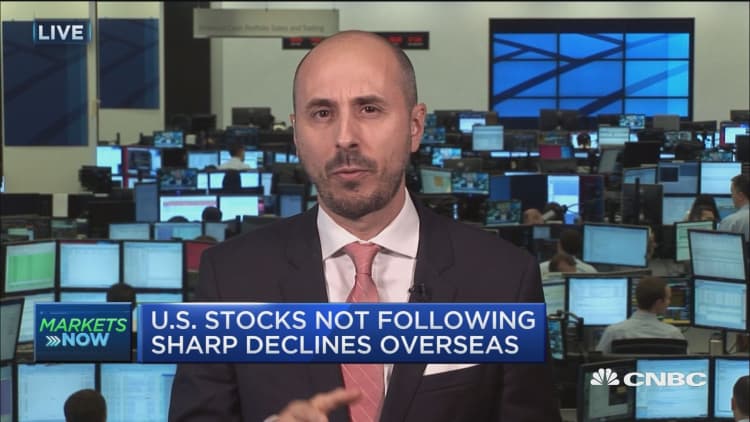
Again Capital Partner John Kilduff on Monday pointed to weak manufacturing and investment data in Asia as further evidence the oil price rally has already peaked.
U.S. crude prices hit a nearly 11-month closing high of $51.23 on Wednesday after falling as low as $26.05 in February. They were trading below $49 on Monday.
"The battering you've seen the Asian markets take overnight is central to undermining the recent rally that we've had," Kilduff told CNBC's "Squawk Box."
"The data keeps coming out worse and worse," said Kilduff, a CNBC contributor.
Internal measures out of China on Monday were "troubling," he added. China's fixed asset investment growth slowed to 9.6 percent in the January-to-May period from 10.5 percent in the January-to-April period, marking the slowest growth since 2000, according to FactSet.
Japanese machine tool orders — a proxy for capital expenditure — also fell by 25 percent year over year in May, following a similar slide in April, Kilduff noted.
Other data would seem to support crude oil demand in China.
Vehicle sales in China rose 9.8 percent to 2.1 million units in May, the China Association of Automobile Manufacturers said Monday, in the strongest year-on-year growth since December.
Energy consultancy FGE said it expects Chinese crude demand to get additional support from stockpiling and refining in the country.
But Kilduff said he believes Chinese crude demand will "fall off a cliff" in the next month or so because the country has nearly filled its strategic reserves.
"Once we lose that pillar of demand, this market should unravel again," he said.
On Friday, Matt Smith, director of commodity research at ClipperData, told "Squawk Box" he expects oil prices to fall back toward $40 a barrel as Chinese strategic reserves reach capacity.
Those views are at odds with a forecast delivered last Thursday by oilman Harold Hamm, who told "Squawk Box" he thinks oil prices will end the year between $69 and $72 a barrel.

Francisco Blanch, head of global commodities and derivatives research at Bank of America Merrill Lynch, said he does not expect oil prices to recover to $70 a barrel until the middle of 2017.
In the near term, crude oil prices can fall by $7 to $10 a barrel in the back half of the summer as peak driving season winds down, he told CNBC's "Squawk on the Street" on Monday.
The market is currently too concerned with the return of U.S. shale oil production, which is a small percentage of total global supply, he said.
U.S. oil output ticked up recently after 15 weeks of consecutive output declines. American drillers have also added rigs to oil fields for the past two weeks.
Blanch said he is more focused on demand, particularly among emerging market nations he calls "the new sultans of swing," including India, Turkey and the Philippines.
"I think that's what's going to adjust the market ultimately, so we've got to really keep a close eye on demand in emerging economies here," he said.
— Reuters contributed to this story.


